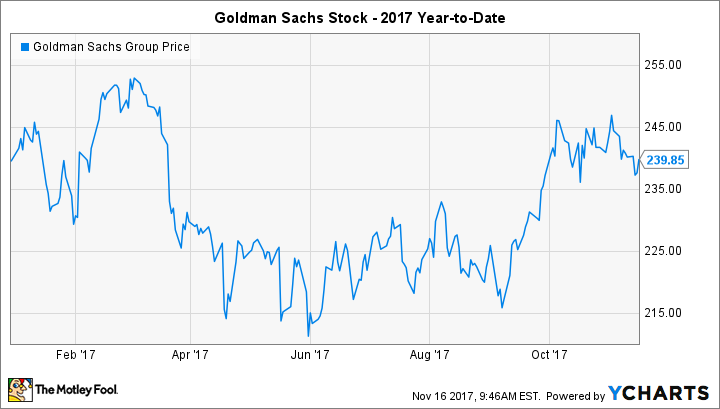Will 2018 Bring a Goldman Sachs Stock Split?
Some people love it, while others despise it. Yet Goldman Sachs (NYSE: GS) still commands a reputation as the quintessential Wall Street financial institution, and few financial stocks have matched its performance over the long run. 2017 hasn't been all that strong a year for Goldman, but things have started to pick up for the investment bank toward the end of the year, and its high share price makes it the second most-influential stock in the Dow Jones Industrial Average (DJINDICES: ^DJI).
Many investors have looked for a stock split from Goldman for years now. So far, they've been disappointed, and some believe that there's little reason for Goldman Sachs to consider a split right now. Others, though, see pressure building for the company to take action. Below, we'll take a closer look at Goldman Sachs to see whether 2018 might be the year that the Wall Street giant makes a move on the split front.
Has Goldman Sachs ever done a stock split?
Most companies that have Goldman Sachs' size, reputation, and long-term stock performance have made at least one stock split during their history. Yet in nearly 20 years as a publicly traded company, Goldman has never made the move to split its shares.
By avoiding stock splits, Goldman has defied conventional wisdom that many of its banking peers have followed. Goldman shares started trading well above the $100 per-share mark shortly after the company's IPO, but the bear market in stocks from 2000 to 2002 quickly pulled Goldman's stock downward to make a split less attractive.
By the mid-2000s, Goldman had recovered and posted huge gains due, in large part, to its success in navigating the booming markets in housing and commodities. Share prices rose to nearly $250 per share in 2007, yet Goldman still resisted the impulse to do a split. Once again, that restraint proved prescient, as the financial crisis in 2008 and early 2009 caused a major collapse in the industry that caused Goldman to give up much of its gains from the boom years earlier in the decade.

Image source: Goldman Sachs.
Will Goldman split its shares in 2018?
The environment for stock splits has changed a lot in the last decade, making the moves far less common in the market as a whole. With discount brokers making it easy to buy and sell small numbers of shares, the pressure to keep share prices down for ease of trading has largely disappeared.
Yet the one thing that could change things for Goldman is the place among the 30 stocks of the Dow Jones Industrials that the investment bank earned back in 2013. Unlike in the 2000s, Goldman's spot in the price-weighted market benchmark gives it influence over the entire Dow, and its high share price gives it a weighting of about 7%, double what it arguably should have if the Dow were weighted equally among its 30 stocks. Goldman's market cap is just a small fraction of the market caps of its banking peers in the Dow, but its price gives it far more importance.
It's uncertain whether the overseers of the Dow will put pressure on Goldman to do a stock split, but Goldman isn't the only culprit. With 15 stocks trading above $100 per share, and three other companies with share prices above $200, Goldman could argue that concerted effort among all Dow components is necessary to bring the average in line. That level of coordination seems unlikely, and that should give Goldman the leeway to keep operating as it sees fit.
If you just look at its share price, Goldman could easily justify a stock split in 2018. Yet with almost 20 years of split-less history behind it, there aren't any obvious catalysts that would prompt a change in that philosophy in the foreseeable future.
More From The Motley Fool
6 Years Later, 6 Charts That Show How Far Apple, Inc. Has Come Since Steve Jobs' Passing
Why You're Smart to Buy Shopify Inc. (US) -- Despite Citron's Report
Dan Caplinger has no position in any of the stocks mentioned. The Motley Fool has no position in any of the stocks mentioned. The Motley Fool has a disclosure policy.

 Yahoo Finance
Yahoo Finance 
